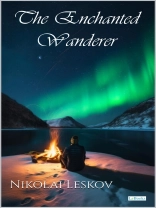The Enchanted Wanderer by Nikolai Leskov is a compelling collection that showcases the author's mastery of storytelling, rich characterization, and deep engagement with Russian folklore and history. The title story, The Enchanted Wanderer, follows the life of Ivan Fyodorovich, a man shaped by fate and mystical experiences, whose journey embodies themes of destiny, faith, and resilience. Through a blend of realism and the supernatural, Leskov presents a vivid portrait of Russian society, capturing the moral struggles and spiritual endurance of his characters.
Since its publication, the collection has been praised for its unique narrative style, combining oral storytelling traditions with a sophisticated literary approach. Leskov's ability to depict the lives of ordinary people with profound depth and authenticity has cemented his status as one of Russia’s great literary figures. His stories explore themes of redemption, sacrifice, and the tension between human will and divine intervention, making them timeless reflections on the human condition.
The enduring appeal of The Enchanted Wanderer and Other Stories lies in its intricate fusion of history, folklore, and moral inquiry. By weaving together humor, irony, and philosophical depth, Leskov offers a compelling exploration of the Russian spirit, inviting readers to reflect on the complexities of fate, virtue, and the unpredictable course of life.
About the author
Nikolai Leskov was a Russian writer known for his richly detailed and vividly narrated stories that capture the essence of Russian life. A master of storytelling, Leskov's works often focused on the moral dilemmas, virtues, and vices of everyday people, blending realism with folklore and humor. Though less internationally recognized than some of his contemporaries, he remains one of the most original voices in Russian literature.
Leskov began his literary career as a journalist before turning to fiction. His stories are marked by an intricate use of language, regional dialects, and oral storytelling traditions, setting him apart from the dominant literary figures of his time. Among his most famous works is ‘Lady Macbeth of Mtsensk’ (1865), a psychological novella about passion and crime in provincial Russia, later adapted into an opera by Dmitri Shostakovich.
Leskov's narrative style, rich in colloquialisms and humor, was ahead of its time and influenced later Russian writers, including Anton Chekhov and Maxim Gorky. Despite his literary achievements, he was often overshadowed by contemporaries like Tolstoy and Dostoevsky, partly due to his refusal to align strictly with the political ideologies of his era.
His works remain an invaluable window into 19th-century Russian society, offering deeply human and often humorous perspectives on life's contradictions. While his novels and short stories were not always widely appreciated in his lifetime, they have since been recognized for their literary












